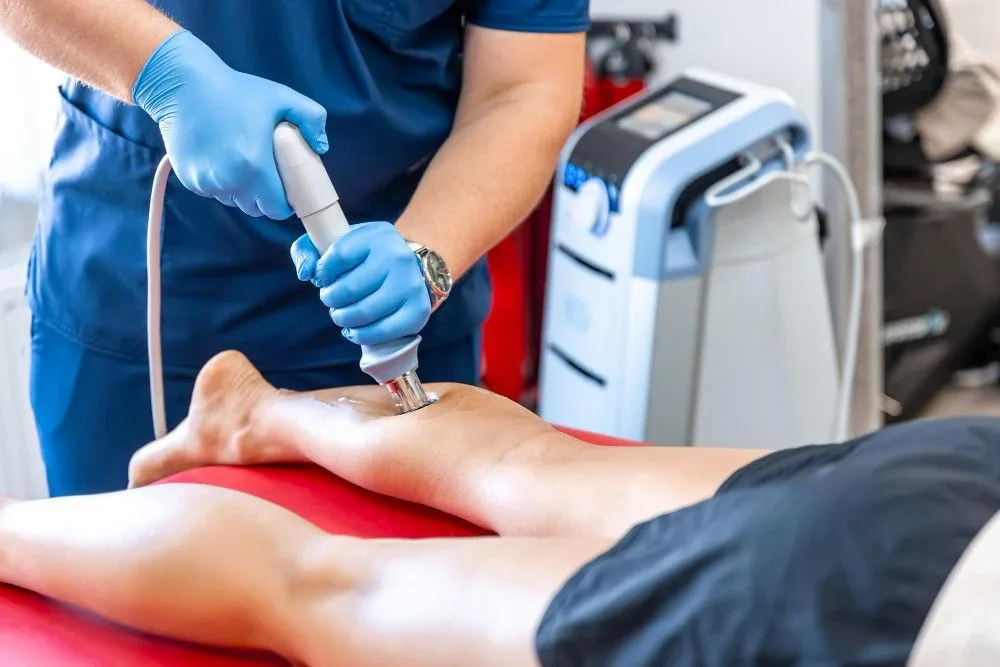Persistent buttock pain can be frustrating and worrying, especially when it doesn’t improve with rest or simple remedies. While the most common causes are usually muscle strain, nerve compression, or injury, in rare cases, buttock pain may signal something more serious, like cancer. This raises an important question: is buttock pain a cancer symptom?
Recognizing the difference between everyday pain and warning signs is key to early detection and timely treatment. In this article, we’ll explore when buttock pain could be linked to cancer, other possible causes, and the steps to take if you’re concerned about your symptoms.
Is Buttock Pain a Cancer Symptom?
Yes, buttock pain can be a symptom of some types of cancers, but in rare cases. It can be considered a cancer-related symptom, especially if it is unexplained, persistent, and comes along with other warning symptoms, such as rectal bleeding, changes in bowel movement, or lumps around the anus.
The buttock pain can be caused by:
-
Tumors that press on nerves or muscles
-
Cancer that spreads to the bones or nearby soft tissue
-
Spinal or pelvic tumors that impact nerve function
Types of Cancer That Might Cause Buttock Pain
The following are several types of cancer that can lead to buttock pain as a potential symptom:
1. Colorectal Cancer
-
How it causes pain: If a tumor enlarges big enough, compress the nerve or reach the pelvic area, it may cause pain in the buttocks.
-
Other symptoms may include:
-
Bloody stool
-
Fatigue
-
Changes in bowel habits
-
Unexplained weight loss
2. Anal Cancer
-
How it causes pain: By compressing the nerves in the pelvic area or tailbone, the anal tumor can cause pain in the buttocks.
-
Other symptoms may include:
-
Rectal bleeding
-
Itching or painful anus
-
Lump in or around the anus
-
Discharge from the anus
-
Changes in bowel habits (like diarrhea or constipation)
-
Swollen lymph nodes in the anal area
-
Irregular feces
3. Bone Cancer
-
How it causes pain: Bone cancers (e.g., osteosarcoma or Ewing sarcoma) affect the pelvis, sacrum (base of the spine), or femur, which can radiate significant pain to the buttocks.
-
Other symptoms may include:
-
Swelling in the impacted area
-
Tender bones
-
Intense pain at night
4. Prostate Cancer (in men)
-
How it causes pain: The advanced stage of prostate cancer can reach to bones of the spinal or pelvic area, which causes buttock pain.
-
Other symptoms may include:
-
Trouble urinating
-
Bloody urine or semen
5. Gynecological Cancers (in women)
-
How it causes pain: Certain gynecological cancers, such as ovarian, uterine, or cervical cancer, can spread or press on the structures of the pelvic region, contributing to buttock pain.
-
Other symptoms may include:
-
Irregular vaginal bleeding
-
Pelvic pressure
-
Pain during sexual intercourse
6. Sciatic Nerve Tumors
-
How it causes pain: These are rare tumors that grow on or around the sciatic nerve, which originates in the lower back and runs through the buttocks, down each leg. This results in radiating pain in the buttocks.
-
Other symptoms may include:
-
Sharp or burning pain in the leg
-
Numbness or tingling sensation
-
Muscle weakness
Other Buttock Pain Causes
Other than cancer, which is a rare cause, the common culprits behind the pain in the buttocks are:
-
Anal fissures
-
Constipation
-
Muscle strain
-
Herniated disc
-
Piriformis syndrome (Sciatica)
-
Myofascial pain syndrome
-
Trauma
-
Degenerative disc disease
-
Spinal stenosis
Characteristics of Cancer-Related Buttock Pain
Cancer-related pain in the buttocks has different characteristics compared to its common causes:
Pain Quality:
-
Deep, throbbing, or aching pain
-
Progressive that worsens with time
-
Pain that does not resolve with rest or traditional treatments
-
Night pain that interrupts sleep
-
Persistent pain
Associated Symptoms:
-
Unexplained weight loss
-
Persistent weakness or fatigue
-
Loss of appetite
-
Fever without a clear reason
-
Changes in bladder or bowel habits
-
Numbness or tingling sensation in the legs
-
Visible lumps or masses
If you experience any of these symptoms, consult a healthcare professional for the proper diagnosis and treatment.
How is Cancer-Related Buttock Pain Diagnosed?
Accurate diagnosis is crucial for finding the exact cause of cancer-related buttock pain and creating a personalized treatment plan. The diagnostic process includes:
Initial Medical Evaluation
-
Medical History: Know family or personal history of cancer.
-
Physical Examination: Check visible lumps or masses and range of motion, and examine the abdomen, pelvis, and spine.
Diagnostic Tests
Imaging Studies:
-
X-rays: To check for bone abnormalities.
-
MRI: To examine the bones and soft tissue in detail.
-
CT scan: To detect any masses or metastases (spread of cancer).
-
Bone scan: To identify the spread of bone cancer to other parts of the body.
-
PET scan: To check whether the pain is caused by cancerous cells.
-
Endoscopy: To look for symptoms associated with anal cancer or take tissue samples.
-
Anoscopy: To see the anal path and spot lumps or red skin.
-
Proctosigmoidoscopy: To check the abnormalities in the sigmoid colon.
Laboratory Tests:
-
Complete blood count (CBC): Identifies abnormal white blood cells, infection, or anemia, a sign of cancer or bone marrow tumor.
-
Comprehensive metabolic panel: Assess the abnormalities in the kidney and liver that help indicate the spread of cancer.
-
Inflammatory markers (ESR and CRP): Evaluate the high inflammation levels associated with tumor-related tissue damage or cancer.
-
Cancer markers (PSA, CA-125, or CEA): PSA detects prostate cancer, while CA-125 helps detect ovarian cancer.
Tissue Sampling:
-
Biopsy: To confirm the cancer, if imaging studies show masses
-
Bone marrow biopsy: If blood cancer is suspected.
Treatment for Cancer-Associated Buttock Pain
If the doctors diagnose the specific cancer that is causing the buttock pain, they provide the treatment based on the type, stage, and location of the cancer:
Pain Management:
-
Medications: Antidepressants, opioids, corticosteroids, and anti-inflammatories to manage pain and inflammation.
-
Nerve blocks: To provide relief from targeted pain near the affected nerves.
-
Physical therapy: Stretches and gentle exercises to improve mobility, reduce pain, and enhance function.
-
Complementary approaches: Acupuncture, relaxation techniques, and massage to manage pain.
Primary Cancer Treatment:
-
Surgery: For the removal of the tumor.
-
Chemotherapy: Use chemotherapy drugs that move throughout the body to target and kill cancer cells.
-
Radiation therapy: Shrinks the tumor that presses on nerves or bones and relieves pain.
-
Targeted therapy: Uses specific medications to target particular molecular abnormalities in cancerous cells.
-
Immunotherapy: Trains the body's immune system to fight against cancerous cells.
Risk Factors for Cancer-Related Buttock Pain
These factors can increase the risk:
-
Age over 50: Cancers, such as prostate cancers, linked to buttock pain, are more common in people over 50 years of age.
-
Family history of cancer: If cancer runs in the family, it increases the chances of developing it, which may cause buttock pain as a symptom.
-
Previous cancer diagnosis: Raises the chances of spread or recurrence of cancer, affecting nerves, bones, and tissues in the buttock area.
-
Smoking history: The CDC reports that smoking is associated with many types of cancer, like lung, colorectal, stomach, and bladder cancer. These cancers can cause nerve compression or spread, leading to buttock pain.
-
Excessive alcohol intake: A 2025 study shows that excessive intake of alcohol is linked to liver, colorectal, breast, oral cavity, and esophageal cancer. This can lead to referred pain to the buttocks.
-
Exposure to chemicals or radiation: Exposure to chemicals or radiation for a prolonged period can increase the chances of bone and soft tissue cancers, which can occur as persistent buttock pain.
How to Prevent the Risk of Buttock Pain Associated with Cancer?
There’s no sure way to stop it. But you can cut the risk by considering these measures:
-
Eat a balanced diet that is rich in green vegetables and fruits.
-
Quit smoking and limit alcohol intake.
-
Maintain a healthy body weight.
-
Exercise regularly.
-
Practice safe sex, especially anal sex.
-
Strengthen your immune system.
Also, follow cancer screening guidelines consistently, like:
-
Colorectal screening: at the age of 45 to 50
-
Prostate screening: after the age of 50
-
Cervical screening: Regular
-
Breast screening: Regular
Summing Up
So, is buttock pain a cancer symptom? In most cases, no, but it should never be ignored if it is persistent, unexplained, or accompanied by other concerning signs. While buttock pain is usually caused by conditions like muscle strain, sciatica, or joint issues, in rare cases, it can be linked to certain cancers.
Pay attention to your body and seek medical advice if the pain lingers or worsens. Early evaluation by a healthcare professional not only rules out serious causes but also ensures timely treatment if needed. Remember: early action brings peace of mind and better health outcomes.
Frequently Asked Questions
What are the symptoms of buttock pain cancer?
Lumps, swelling, bleeding, pain, and irregular feces are signs of buttock pain cancer.
Does colon cancer cause buttock pain cancer?
Buttock pain is a grave sign of colon cancer. Additionally, urinary symptoms can be seen in patients with colon cancer.
How can I reduce buttock pain?
Take pain medications, use a hot pack or a cold pack, try gentle daily stretches and warm-ups for your legs, hips, and buttocks. Use a cushion when you're sitting to relieve symptoms.
What is metastatic cancer buttock pain?
It refers to discomfort or pain in the buttock area caused by cancer that has spread from its original site to the bones, soft tissues, or nerves in the buttocks.
Is buttock pain more common in certain cancers?
Yes, it is more related to colorectal, spinal, and pelvic cancers, especially when they press on nerves or spread to nearby tissues.
Can early detection of cancer prevent buttock pain?
Yes, in most cases, which helps relieve symptoms as well as outcomes.
-User-1754377709.png)
Reviewed by







